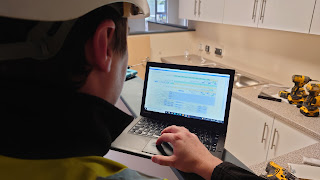What Affects the EPC?
I'm often asked, what exactly affects the EPC? How can I ensure I get the best results?
The EPC. It is a vital piece of information that indicates what the typical running costs of your property will be. What you have to remember is that the better the EPC result, the more interest you'll get when trying to sell your property.
A new build, or newer build, will be more energy efficient due to the updated building standards it's had to conform to.
The construction of the build will also impact your results. Builds constructed before the 1930’s will likely be a solid wall construction, meaning no cavity. The problem is that the walls will not keep the heat in as well as a home with an air gap between the two courses of brick work, or if they have insulation in between. This makes the build less efficient than a newer build, which has a developed cavity wall.
A property which is mid terraced will usually perform better than a detached build of the same age. The more walls exposed to the elements, the less energy efficient it will be. Also if your build has large rooms to heat, this can also have an impact.
Loft insulation is the easiest and cheapest way to increase the energy efficiency of your build. The minimum recommended amount of insulation is around 270mm.
Small changes, such as changing the lighting to LED light bulbs, might not mean a massive change in the results, but every little helps. If you're on the cusp, then this is a small change which might just bring you over the line.
Double or even triple glazed windows will help retain the heat of your home, and in turn increase your EPC result. Most homes have double glazing, but why not take it up a notch and increase to triple glazing to make the most of your build?
The controlled heating system will also impact your results. There are many forms of heat controls, such as thermostats, programmers, and radiator thermostats (TRV’s). These will improve the efficiency of the property, because you can control the amount of heat used, and not waste energy where it is not required in your home.
The most important factor of an EPC is the energy source. Energy is obviously used to heat the property, and therefore will impact the EPC score. An example of this would be that a build using gas for heating will have a better result than a build using electricity for heating. The reason for this is that the unit for gas is cheaper than many other forms of energy sources, and is also less harmful to the environment when considering the CO² emissions produced in the process of generating electricity. However, we have so many new ways to heat builds now, such as Air Source Heat Pumps, where the energy is essentially extracted from the air. If you're in an existing build, your EPC will be based on the heating method you have installed. However, if you're looking to build, consider the more energy efficient alternatives.
The boiler is also another key factor that can affect the property’s score. There are various boilers with many efficiency levels. A boiler from the 70s will have an efficiency of around 65%, but newer boilers must have a minimum efficiency of 88%. Therefore, changing the old boiler for a new one will increase the EPC score, making the property more efficient.
The EPC is vital to your build. There are many ways to ensure you get the best results, but to do that, you need to understand your systems, materials and construction methods. The best way is to get the help and advice of an expert at the earliest possible stage.




No comments:
Post a Comment